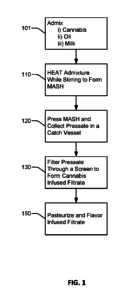CannabIP: U.S. Patent No. 10,028,987 B1
U.S. Patent No. 10,028,987 (‘987) issued on July 24, 2018, for “Cannabis-Infused Milk.” It was issued to inventor Dylan Pillsbury, of Dos Rios, California. The applicant/assignee is Chocowaska Cooperative, Inc., a cannabis-infused edibles and hemp company. The claims are directed to a method of preparing and processing milk infused with cannabis, which includes heating the combined mixture of cannabis, milk, and coconut oil between 150° F. and 220° F., which creates a mash, pressing the mash into a pressate, then filtering the pressate to produce the infusion. The specification also describes several recipes of cannabis-infused milk, including THC Chocolate Hemp Milk, THC Vanilla Hemp Milk, THC Strawberry Hemp Milk, THC Mocha Hemp Milk, HTC Peppermint Chocolate Hemp Milk, High CBD Pumpkin Hemp, High CBD Black Cherry Hemp, and High CBD Vanilla Hemp Milk.
The products are sold under the WASKA® label (International Class 5, for nutritionally fortified medicinal beverages; herbal beverages for medicinal purposes; nutraceuticals for use as a dietary supplement with digestion, anxiety, inflammation, stress, and fatigue; dietary supplemental drinks in the nature of vitamin and mineral beverages; protein supplement shakes; nutritional supplement energy beverages for beauty purposes, namely, promoting healthy skin, hair and nails, boosting energy, and encouraging relaxation and rest; beverages for medical purposes, namely, herbal drinks and shakes, vegetable drinks, vegetable juices, and energy drinks containing nutritional supplements).
 Source: U.S. Patent No. 10,028,987 B1, to Dylan Pillsbury (inventor), Chocowaska Cooperative, Inc. (assignee)
Source: U.S. Patent No. 10,028,987 B1, to Dylan Pillsbury (inventor), Chocowaska Cooperative, Inc. (assignee)
Figure 1 below illustrates the claimed invention as described in the ‘987 patent.
The International Patent Classification are G06F 21/00 (electric digital data processing, specifically security arrangements for protecting computers, components thereof, programs or data against unauthorized activity), and H04L 29/06 (transmission of digital information, e.g., telegraphic communication, specifically arrangements, apparatus, circuits or systems not covered by a single one or groups, further characterized by a protocol).
This is example of what types of patents available to cannabis startups. Infusions are one aspect of the larger family of edibles which are potentially patentable subject matter. Also, it is interesting that the applicant and inventor decided to file IP protection for the recipes as a patent, rather than keeping the formulations as a trade secret. The recipes could be protected under the federal statute, 18 U.S.C. §1836, or the California state statute, Civil Code §3426, but opted for patent protection instead. Each company’s rationale is different and the decision to make a business secret public or confidential is an individual one. Please contact Yonaxis for more information on any of the IP processes described in this posting if you have any questions.

Brent T. Yonehara
Founder & Patent Attorney
Founder Brent Yonehara brings over 20 years of strategic intellectual property experience to every client engagement. His distinguished career spans AmLaw 100 firms, specialized boutique I.P. practices, cutting-edge technology companies, and leading research universities.
More About Brent